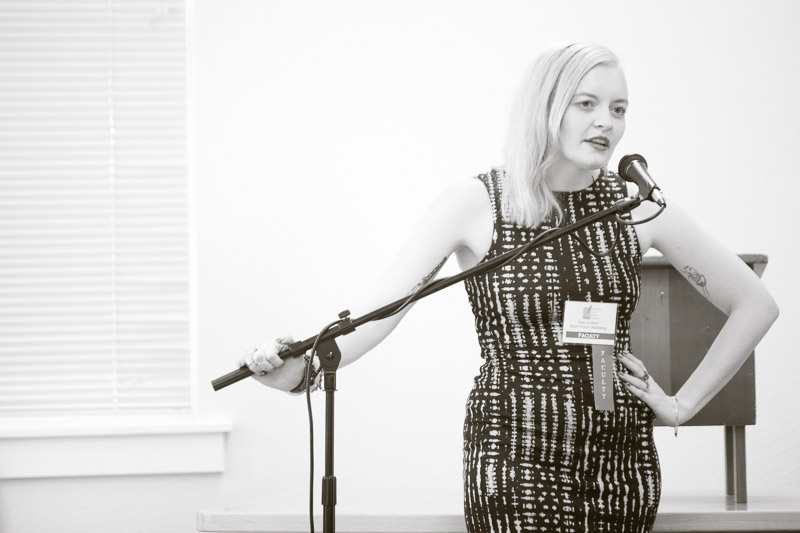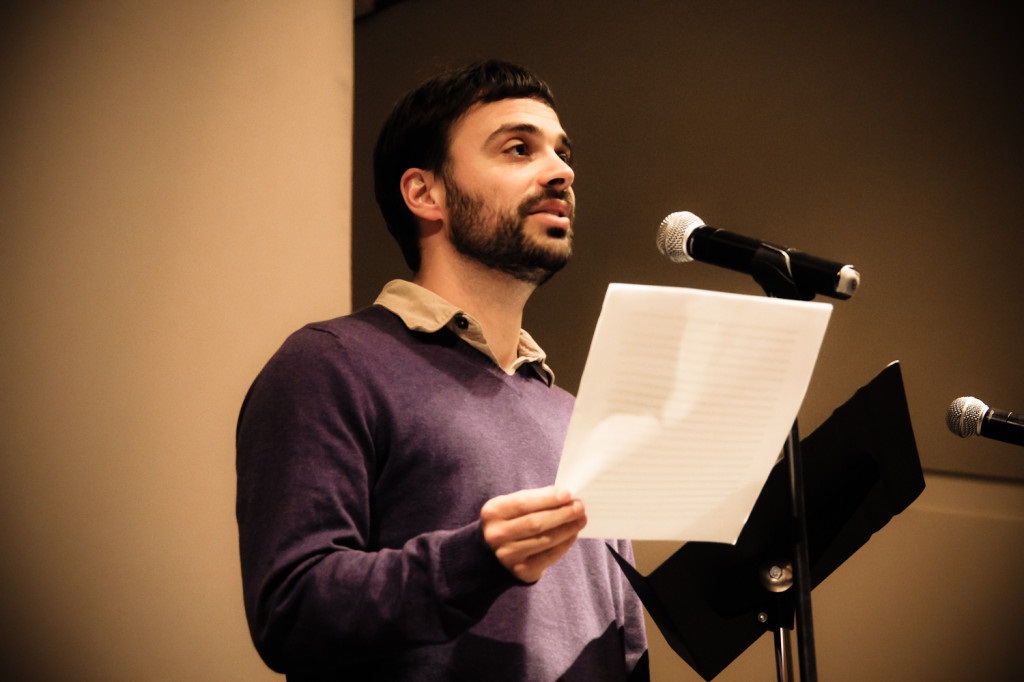By Cameron Lund, MCWC Social Media Manager
I had the pleasure of sitting down recently with Lisa Locascio, who is returning to MCWC 2017 as the Emerging Writers workshop instructor. Lisa is a creative force to be reckoned with. She holds a PhD in Creative Writing and Literature, an MA in English Literature from USC, as well as an MFA and BA from NYU. She has been nominated for a Pushcart Prize and has won the 2011 John Steinbeck Award for Fiction, the 2014 Robbins Memorial Emerging Writer Award, and a 2014 Dorys Grover Award. She is currently a Visiting Assistant Professor of Creative Writing at Wesleyan University and working as an editor and publisher—in fact, she has just completed the curation of an anthology, Golden State 2017, featuring two other MCWC 2017 faculty members, Kat Meads and Kara Vernor—and her novel, Jutland Gothic, will be published by Grove Atlantic in 2018. Suffice it to say, Lisa has a lot on her plate, and we’re thrilled that she has made time for this summer’s conference, and for this interview.
What is your favorite genre to write in? Has it always been your favorite or has that changed over time?
I’ve always liked to tell stories, and I’ve been telling them through fiction and poetry for as long as I can remember. Writing creative nonfiction came to me a bit later, as a result of the training in critical writing and slam poetry I received in high school. While those two modalities might seem contradictory, they have similar missions of elucidating and exploring that which is seen and known, and writing in those ways helped me understand and portray my experiences as vividly as those I wholly invented.
Over time, the lines between the genres have blurred for me, and today I produce a significant amount of writing that is all of the above—at the same time poetry, fiction, and creative nonfiction. Rather than a shift of interests over time, I consider this movement in my work the result of sharpening my knife and diving deeper and more fearlessly into the sea of consciousness where David Lynch suggests we seek to "catch the big fish" of ideas. This is the creative actualization I wish for every writer, and which I endeavor to help my students achieve.
How did you first get published? How did you get an agent? Do you have any advice for newbies?
I think the first time I was published in a journal that wasn’t affiliated with my school or creative circle in any way was towards the end of college, when a story of mine showed up in Prairie Margins, the undergraduate literary magazine of Bowling Green State University. Another big moment for me was when my story "Mallinckrodt" was published in the late great Northwest Review in 2008, when I was in the first year of my MFA.
As for my agent, Marya Spence, I was very lucky that she found me, in fact through my work as an editor. She read a story I had edited for Joyland, the fiction magazine of which I am co-publisher, and through that connection found my website and read a great deal of my work. I feel blessed to work with such a whip-smart, wise, and devoted creative ally, especially since she reached out to me after six frustrating years of trying to find an agent.
As for advice on being published and becoming agented, I’ll paraphrase the great Isaac Babel story "You Must Know Everything" and tell you that you must do everything: submit everywhere, be relentless and bulletproof to rejection, which you will receive in droves from magazines and agents alike. Try everything, keep going, and remember that publishing is a numbers game—the more places read your work, the more likely it is that one will want to publish you. Finding an agent is the search for a highly personal relationship, a lot like matchmaking, and just as finicky and magic-reliant; if you pay attention to who reps the writers you admire, send only your most polished and highest-quality work, and respect the difficulty of their job, you position yourself well to find good representation.
Can you tell me a bit about the workshop you’ll be teaching at MCWC 2017?
The Emerging Writers workshop is designed for those whose creative identities are still coalescing, writers who seek to establish an understanding of themselves and their literary style, people from across the spectrum of age and life experience who wish to engage deeply with the self and the world to produce beautiful and meaningful work. It will be a supportive environment with great mutual respect between students and teacher and a deep and sacred sense of the honor of working together to help each other’s writing become the best and most realized version of itself. I’m so excited to teach this class!
Do you have any advice for someone who may be nervous about taking your class?
My job as a teacher is to create a space where the vital dream-work of workshop can occur, where things can get a little messy and weird, where ideas can bloom and be nurtured and undergo delicate, exquisite surgery to become more themselves. It’s good to be nervous if that nervousness is a sign of excitement at the immensity of the task ahead, but don’t be afraid! We will emerge as friends and better writers for having shared each other’s company. The best advice I can give is to be yourself, honest and open; if you show up with sincerity, respect, and curiosity, you will have a phenomenal experience.
What do you have to say to emerging writers in particular?
Be kind to yourself. Writing is an enormously complex ancient technology developed to address the problem of limited human memory, and yet we act like it should be as natural as breathing. Well, breathing is actually really complicated too, we just have a lot of practice at it. Practice is what writers need as well: practice writing, but also practice noticing and thinking and feeling, and practice incorporating each of these acts and their multifarious allies into a writerly way of being that is as idiosyncratic as each writer. Be gentle. Feel good. Keep going.
Can they draw hope from your own trajectory?
I first came to the conference as a scholarship student, in 2012, when I took Steve Almond’s Short Fiction workshop and won the short fiction prize, a huge honor. Then I was invited to return as faculty in 2015, an even huger honor! I had such a delightful time teaching that year’s Short Fiction workshop; I met many people who became quite important to me, and it's no overstatement to say it was a life-changing experience. I was itching to come back and so happy when my invitation arrived to teach in 2017.
To register for Lisa’s Emerging Writers workshop, please visit mcwc.org. Attendance is limited to 14 on a first-come, first-served basis. The class is open to writers of all genres.
If you have never attended our conference before, you may also submit an application for a First Taste of MCWC scholarship.
**SUBMISSION DEADLINE IS MAY 15, 2017.**
You can find out more about Lisa at her website: www.lisalocascio.com













